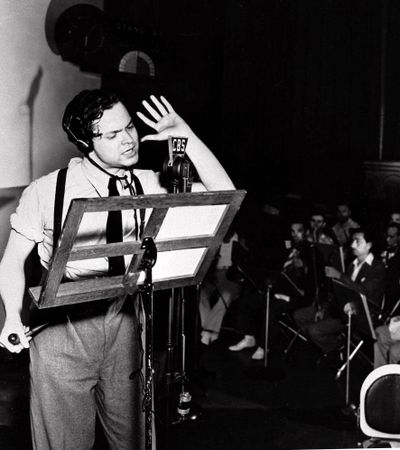‘War of the Worlds’ showed radio’s power
Orson Welles’ broadcast 70 years ago sent listeners into a panic

On Halloween eve 1938, the monsters arrived early.
Theatergoers fled Broadway after hearing a radio report that marauding Martians had landed in Grover’s Mill, N.J., and were advancing on New York City.
Switchboards at newspapers and police stations buzzed from Boston to San Francisco with calls from panicked listeners who feared incineration from the Martian death rays.
One Massachusetts man scraped together $3.25 for a railway ticket – only to learn 60 miles later that he and thousands of others had been duped by a CBS radio dramatization of H.G. Wells’s science fiction novel, “War of the Worlds.”
The culprit was 23-year-old Orson Welles and his Mercury Theater players.
While Welles’s Martians laid waste to Manhattan, Norman Corwin was busy in another CBS studio a floor above.
“I was rehearsing a documentary program, and was completely unaware that Orson had emptied the living rooms of America,” Corwin, now 98, recalled recently from his Los Angeles home.
Corwin, a major figure during radio’s golden age, said that the “War of the Worlds” broadcast “first demonstrated the up-to-then unrealized ubiquity of radio and its power to affect people – in this case to scare them out of their wits, and, in many cases, their homes.
“The fact that this effect was unintended and accidental only increased the surprise, shock, and dismay that it engendered,” he added.
With Nazi Germany’s annexation of part of Czechoslovakia still fresh in the minds of a jittery public, Welles’s use of realistic news bulletins convinced thousands of Americans that war had reached their shores.
Many did not catch the repeated disclaimers made during the CBS broadcast, and by morning there were threats of lawsuits and criminal action.
The newly created Federal Communications Commission launched an investigation, CBS apologized, and Welles’s weekly radio series picked up a much-needed commercial sponsor, Campbell Soups.
Joseph McBride, the author of three acclaimed books on Welles, said the broadcast’s notoriety intensified Hollywood’s interest in Welles, who had already made his mark on Broadway. Months after the broadcast, RKO Pictures signed Welles, who would make his film acting and directorial debut with the landmark “Citizen Kane” in 1941.
“I asked Welles in 1971 if he had any regrets about the ‘War of the Worlds’ broadcast, and he scoffed, rather indignantly, asking me what there was to regret,” recalled McBride.
“(Looking back), the broadcast does not overshadow his other work, nor does the prankster-troublemaker aspect of the show loom as large as it did,” he said. “If anything, his satirical use of the media and demonstration of how the media can be used to scare the populace – which he claimed was part of his motive – now seems more prescient. ‘Citizen Kane’ also showed how ahead of his time Welles was in identifying media manipulation as a threat.”
The lessons of Oct. 30, 1938, remain relevant today, said Michael Harrison, publisher of Talkers, a leading radio and Internet trade magazine.
“We still live in terror of things we don’t understand, and we place our faith in the media for information,” he said. “And the situation today is ripe for fraud and deceit.”
The wall between news and entertainment has been broken down, particularly in television, where news shows often feature celebrities and infomercials with discreet disclaimers masquerading as news programs, Harrison said.
“In an attempt to win ratings,” he added, “the cable television news networks sensationalize news stories with additional music, graphics, polls, and pulling in ‘experts’ with questionable credentials.”
Harrison believes that Welles fully understood the power of the mass media in 1938, and successfully used it to promote himself.
Welles quipped in his 1973 film, “F for Fake,” that a broadcaster who later performed the “War of the Worlds” on South American radio was tossed into prison, but “I didn’t go to jail; I went to Hollywood.”
Welles’ film career, including the groundbreaking “Citizen Kane,” are the greatest legacy of “The War of the Worlds” broadcast, said Howard M. Ziff, film aficionado and founder of the journalism department at the University of Massachusetts in Amherst.
“When Welles went to Hollywood, he took the ‘War’ with him – members of his radio team and a profound sense of what was happening in American popular culture.”
Until his death in 1985, Welles remained a talented but noncommercial filmmaker. He found himself at odds with studio heads or searching for funds to finance projects, such as “Othello,” which won the grand prize at the Cannes Film Festival in 1952.
McBride remembers Welles as “a rebel and a maverick and a radical.”
He said, “All these things made it difficult for him to function in the commercial world, although those traits are part of what made him such a rare and challenging artist.”